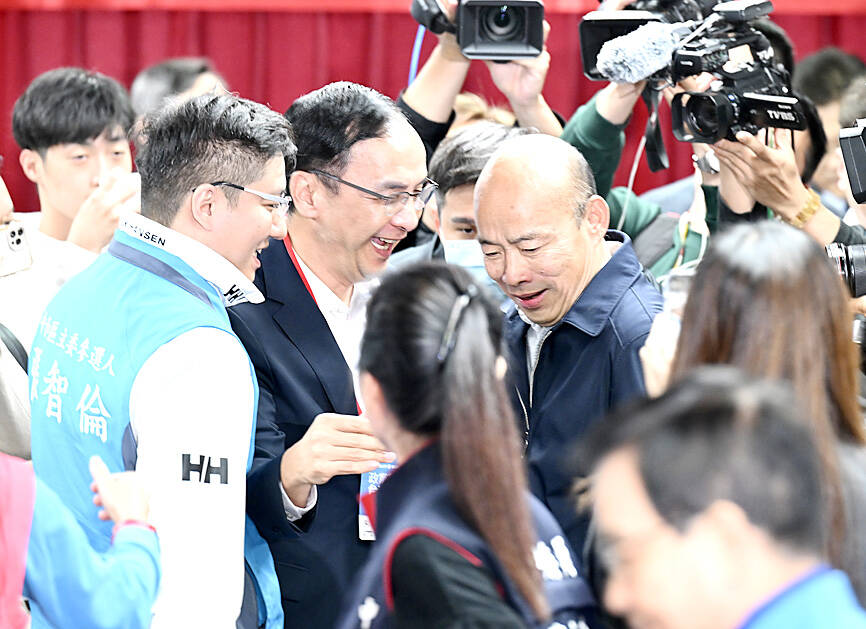Former Kaohsiung mayor Han Kuo-yu (韓國瑜), the Chinese Nationalist Party’s (KMT) 2020 presidential candidate, topped the party’s list of 34 legislator-at-large nominations for the Jan. 13 presidential and legislative elections, which it released yesterday.
Han, 66, became Kaohsiung mayor in December 2018, but served only for a year and a half.
He lost the 2020 presidential election to President Tsai Ing-wen (蔡英文) of the Democratic Progressive Party (DPP), who was seeking her second term.

Photo: Lo Pei-de, Taipei Times
Later in 2020, he was ousted as mayor in a recall election by Kaohsiung residents who were unhappy that he had run for president so soon after winning the mayorship. He became the first municipal leader in Taiwan’s history to be recalled.
However, Han is considered to be one of the more charismatic KMT members and is popular among the party’s supporters.
As he is at the top of the KMT’s legislator-at-large list, Han could become legislative speaker should the KMT and the Taiwan People’s Party (TPP) form a coalition and win a majority of the seats in the Legislative Yuan. It has been a long-standing practice of the KMT to list its favorite candidate for speaker as its No. 1 legislator-at-large.
Second on the list is former lawmaker Ko Chih-en (柯志恩), who represented the party in last year’s Kaohsiung mayoral election, but lost to incumbent Mayor Chen Chi-mai (陳其邁) of the DPP. She is an expert in education and served as a dean of student affairs at Tamkang University in New Taipei City.
The KMT’s No. 3 pick is Ko Ju-chun (葛如鈞), a blockchain and non-fungible tokens expert in the Chinese-speaking world, who also hosts a podcast. He is an assistant professor at National Taiwan University.
The list also includes five experts the medical field, as well as retired navy admiral Chen Yeong-kang (陳永康).
Also on the list is Li Xia (李霞), who was born in China, but is married to a Taiwanese citizen. She runs a multicultural development association that promotes the rights of Taiwan’s new residents.
The term “new resident” refers to people who have immigrated to Taiwan.
Li is No. 17 on the list, meaning it is extremely unlikely that she will become a lawmaker.
Seventy-three of the 113 seats in the Legislative Yuan are filled by elected candidates, six are reserved for indigenous candidates elected by indigenous voters, and 34 are at-large seats allocated based on the total number of votes obtained by each political party in the legislative election.

Alain Robert, known as the "French Spider-Man," praised Alex Honnold as exceptionally well-prepared after the US climber completed a free solo ascent of Taipei 101 yesterday. Robert said Honnold's ascent of the 508m-tall skyscraper in just more than one-and-a-half hours without using safety ropes or equipment was a remarkable achievement. "This is my life," he said in an interview conducted in French, adding that he liked the feeling of being "on the edge of danger." The 63-year-old Frenchman climbed Taipei 101 using ropes in December 2004, taking about four hours to reach the top. On a one-to-10 scale of difficulty, Robert said Taipei 101

A preclearance service to facilitate entry for people traveling to select airports in Japan would be available from Thursday next week to Feb. 25 at Taiwan Taoyuan International Airport, Taoyuan International Airport Corp (TIAC) said on Tuesday. The service was first made available to Taiwanese travelers throughout the winter vacation of 2024 and during the Lunar New Year holiday. In addition to flights to the Japanese cities of Hakodate, Asahikawa, Akita, Sendai, Niigata, Okayama, Takamatsu, Kumamoto and Kagoshima, the service would be available to travelers to Kobe and Oita. The service can be accessed by passengers of 15 flight routes operated by

Taiwanese and US defense groups are collaborating to introduce deployable, semi-autonomous manufacturing systems for drones and components in a boost to the nation’s supply chain resilience. Taiwan’s G-Tech Optroelectronics Corp subsidiary GTOC and the US’ Aerkomm Inc on Friday announced an agreement with fellow US-based Firestorm Lab to adopt the latter’s xCell, a technology featuring 3D printers fitted in 6.1m container units. The systems enable aerial platforms and parts to be produced in high volumes from dispersed nodes capable of rapid redeployment, to minimize the risk of enemy strikes and to meet field requirements, they said. Firestorm chief technology officer Ian Muceus said

MORE FALL: An investigation into one of Xi’s key cronies, part of a broader ‘anti-corruption’ drive, indicates that he might have a deep distrust in the military, an expert said China’s latest military purge underscores systemic risks in its shift from collective leadership to sole rule under Chinese President Xi Jinping (習近平), and could disrupt its chain of command and military capabilities, a national security official said yesterday. If decisionmaking within the Chinese Communist Party has become “irrational” under one-man rule, the Taiwan Strait and the regional situation must be approached with extreme caution, given unforeseen risks, they added. The anonymous official made the remarks as China’s Central Military Commission Vice Chairman Zhang Youxia (張又俠) and Joint Staff Department Chief of Staff Liu Zhenli (劉振立) were reportedly being investigated for suspected “serious